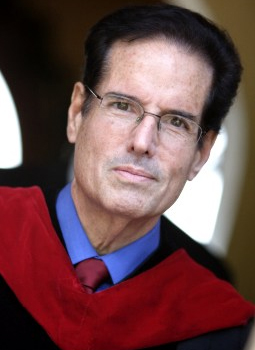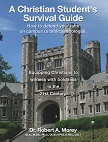Christianity and Humanism
By Dr. Robert A. Morey
PART ONE
The Ten Fundamental Principles of The Christian World and Life View
l. A person's beliefs, values, morals, etc., will be reflected in the way he or she lives (Prov. 23:7; Matt. 12:33-37).
2. We can judge someone on the basis of how he lives (John 7:24; Matt. 7:6,l5-20; Gal. 5:l9-2l; I John 2:4).
3. A nation's culture reflects the beliefs, values, morals, etc., of those involved in the culture-forming process (philosophers, artists, teachers, politicians, lawyers, judges, doctors, wealthy people, and media people).
4. We can judge a culture on the basis of its laws which are simply codified beliefs, values, and morals (Jer.6:22-23; Tit. 1:12-13).
5. Pre-Christian Greek and Roman Pagan cultures codified anti-Biblical laws supporting abortion, infanticide, child abuse and rape, suicide, incest, murder for entertainment, etc.
6. When enough Christians became involved in the culture-forming process in the Roman Empire, pagan laws were repealed and Biblical Laws legislated.
7. Throughout the rest of Western History, the West in terms of its culture was basically "Christian" since its laws reflected the beliefs, values, morals, etc., of the Scriptures.
8. American Christians during the Fundamentalist-Liberal debate in the l920's, developed an inward focus on personal piety to the exclusion of any concern for the culture-forming process. It was thought to be unspiritual to be involved in law, medicine, education, art, politics, etc. They ignored the culture and went "soul winning."
9. Since the Christians abandoned the culture-forming professions, the non-christians moved into the vacuum. The modern pagans are now repealing Biblical laws and reinstating the old pagan laws in favor of abortion, infanticide, etc.
l0. Our only hope is for Christians to once again enter the culture-forming process and when they are in places of influence, to repeal the pagan laws and to reinstate the Biblical laws. If they do not do this as soon as possible, the modern pagans will be in a position to begin the same kind of persecution that their forefathers in the Roman Empire had done to the Christians.
PART TWO
The Christian Viewpoint
Because man is created in the image of God, each human being from the moment of conception to the oldest age has intrinsic worth. The intrinsic worth and dignity of man is immutable and cannot be affected by lack of acquired worth or economic considerations. The utility of a person has no bearing on the intrinsic worth of man as the image-bearer of God. The sanctity of human life in all of its stages from conception to old age leads to the following conclusions:
l. No genetic experimentation on fertilized human eggs should be allowed. The destruction of such eggs is the killing of human life.
2. It is wrong to manipulate the DNA code to determine the gender, race or physical characteristics of human beings.
3. Abortion is always wrong except where the life of the mother is threatened.
4. All forms of infanticide are wrong (either passive or active).
5. All so-called "mercy killing" is actually murder whether it is done through passive or active means.
6. Active or passive euthanasia is always wrong.
7. There should be no age limit for medical care. This would be a form of murder.
8. Suicide should not be legalized. Neither should "suicide clinics" or "death pills."
9. No "final solutions" for "undesirables."
l0. No "liquidation" of those who think differently.
PART THREE
The Humanist Viewpoint
Human life is the result of a chance governed evolutionary process in a closed natural system. There is no intrinsic value to human life for it is no different from animal life. Human life has only acquired worth in terms of its utility and function. When a person's utilitarian worth is over so far as society is concerned, the person has no "Right" to life but only the privilege of life. Thus abortion, infanticide, euthanasia, etc., is perfectly all right. The following arguments prove this point.
1. Economic considerations may lead to the termination of a person. It is cheaper to abort than to give welfare.
2. The fact of or possibility of a "miserable life."
3. "Unwanted children" should be aborted.
4. "Inconvenient" pregnancies can be terminated.
5. "Responsibilities" outweigh "rights."
6. Overpopulation will lead to the need of terminating useless life.
7. Future food and fuel shortages mean planned terminations.
8. The few (unwanted, handicapped, elderly) should be willing to sacrifice for the Many.
9. People in a miserable condition "want to die."
l0. "Parasites" are people who no longer have any contribution to make to the economic health of the state. They do not produce any goods or services. Thus they should be terminated.
CONCLUSION
Humanism is a love affair with death. It means death to morality, truth, justice and freedom. It brings death to the unborn, the aged and the handicap. It turns beauty into ugliness and order into chaos. It has never produced anything that speaks of life.






































